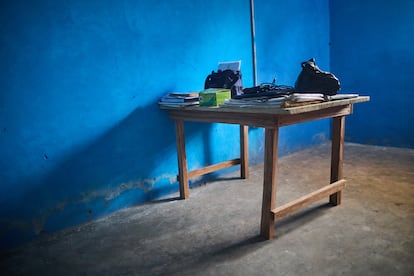Nurses flee Global South to work in healthcare systems of high-income countries
Following the pandemic, the surge in demand for health professionals has further weakened the already fragile systems of African countries. Experts are calling the situation a ‘global health emergency’


Anthony Akum-Nyemi says that he’s a satisfied employee. In a canteen at Addenbrooke Hospital, in Cambridge, he explains that what he earns is enough to live on and to support part of his family in Ghana.
In his home country, he studied nursing at a public college and worked for 10 years, until he decided to move abroad two years ago. He knew that, in the United Kingdom, as in other European or North American countries, nurses are in high demand, especially after the Covid pandemic.
The British hospital facilitated his immigration process and paid for his plane ticket, as well as two months of accommodation. Since then, he’s been delighted to be in the United Kingdom. He would like to live in Ghana, but the difference in conditions ― and not just wages ― is abysmal. “There, sometimes, you have to find a way to find food for the patients, [or] soap and water. Here, they even give them toothpaste. You can do your job well.”
5,000 miles south of Cambridge, in a rural health center in western Ghana, Precious Jessusita Annan is holding her patient consultations. She’s the only midwife in three villages around her. She’s 29 years old and dreams of following the same path as Akum-Nyemi and many of her fellow graduates. “If I had the chance, I would go too,” she sighs. It’s stiflingly hot, but she’s wearing a tight-fitting nursing suit and is treating patients in a very precarious dispensary. She explains that she would like to emigrate because it would be “a way of expanding my knowledge with modern equipment.”
At her district health center, the head, Joseph Abbas Asigiri, says that they’ve lost seven nurses at the Aowin Hospital in the last two years and that others are now preparing for the exams so that they can travel. “They do their three years of compulsory specialization [in Ghana] and then they leave. The state has invested a lot in their training, but there’s still a shortage of doctors and nurses throughout the country.”
Like Akum-Nyemi, between 400 and 500 nurses leave Ghana every month, according to figures from the International Council of Nurses (ICN), which represents 130 national organizations. Ghana is a serious case, but not the only one. The recruitment of nurses from countries in the Global South has continued to increase after the pandemic, despite recommendations against it from the World Health Organization (WHO). OECD figures indicate that the influx of foreign nurses to European countries grew by 72% between 2019 and 2022. In Ireland, for example, more than 50% of the healthcare workforce has studied outside the country. The prevalence of the internet in previously more isolated countries and the massive use of social media have facilitated the connection between employers and potential employees, who are separated by thousands of miles.
It’s clear that countries like Ghana, at least in the short-term, will find it difficult to compete with the opportunities described by Akum-Nyemi, or the ones that Annan yearns for. But it’s not about individual projects, as experts warn, nor about questioning workers’ right to mobility. Rather, it’s about compensating the states of origin, so that there’s a fair exchange. This issue, which is absent in the tense immigration debate, needs to be made visible. There are countries that have made progress in signing bilateral agreements, yet it isn’t clear if the formula has benefitted the countries of origin as intended.
“Foreign nurses support the health systems of high-income countries. Without them, they couldn’t function. They’re a fundamental pillar,” says the CEO of the ICN, Howard Catton, from Geneva. However, the real problem, he warns, is on the other side: in the countries of origin that lose health professionals at an unsustainable rate. The WHO estimates that, by 2030, there will be a shortage of 4.5 million nurses and 310,000 midwives worldwide. The countries most in need are in Africa and Southeast Asia. “We’re facing a global health emergency. We’re very concerned about what’s happening in sub-Saharan countries. The hiring of foreigners only widens the gap between rich and poor countries,” Catton emphasizes.
He refers to a specific paradox: while countries such as the United Kingdom and other European nations send development aid to African states, at the same time, they contribute to decimating structural sectors such as healthcare. This endangers global health. Experts also warn that further weakening the health of countries in the Global South increases the risk of infectious diseases. The experience of the pandemic has shown that, in times of crisis, nationalist reflexes are exacerbated, resulting in a lack of political will to act in a coordinated manner on global health issues.
The magnitude of the problem was set out in the conclusions of the health ministers at the last G20 summit held in Brazil, where they recognized the need to “mitigate any negative effects and implement strategies to better manage migration of the health workforce, supporting and safeguarding the countries with the most pressing health workforce needs.”
Since 2020, the WHO has been compiling a list of countries from which it recommends not recruiting healthcare professionals, due to the low density of doctors and nurses in the population. However, this recommendation isn’t being followed, judging by the figures for arrivals from countries on the WHO list (which is set to be released every three years). Countries such as Liberia, Cameroon, Pakistan and Bangladesh appear on the list.
In Britain, since 2021, the Royal College of Nurses and the Royal College of Midwives report that the number of nurses and midwives registered in the United Kingdom from countries on the WHO’s list has almost tripled, from 12,000 to 33,000. Catton has just returned from Ghana, one of the worst-affected countries and one from which, in theory, it’s not possible to recruit medical personnel… at least not “actively.”

In Ghana, virtually anyone in the health sector queried by EL PAÍS knows someone in their social circle who has left the country. A Ghanaian doctor who prefers to remain anonymous says that “they emigrate en masse. It’s an incontestable fact that the system doesn’t care about those of us who work in the public sector. There’s no hope for young people. They’re all looking for greener pastures.” The doctor has seen members of his family emigrate, against his advice. “They’ve always left… but now, [many more are leaving]. We have almost no [healthcare] infrastructure or workers. The few that are [trained], they leave.”
Across Africa, the education system for nurses is predominantly public. Achim Steiner, chief administrator of the United Nations Development Programme (UNDP), highlighted the importance of this fact recently, during an interview with EL PAÍS in New York City. “[Graduates] don’t fall from the sky,” he said. “They’re the product of years of investment in universities. Structural services are being eroded in their countries of origin.”
According to ICN, the cost of training a nurse in the U.K. can be around £50,000 ($63,000), while the cost of bringing in a nurse from outside the U.K. is around £10,000 ($12,600). The savings are pocketed by the countries receiving the healthcare workers, while the countries of origin lose out. Ghana has 31 nurses per 10,000 inhabitants, or 102,000 nurses in total, while in the U.K., the figure is almost 86 per 10,000. Experts are calling for tariffs or compensation to address the transfer of human resources in crucial sectors such as healthcare.
The right to migrate
The problem isn’t just quantitative, but qualitative as well. There’s particular interest in recruiting experienced professionals, like Akum-Nyem. At the Ghana Registered Nurses and Midwives Association (GRNMA) office in Accra, the capital, General Secretary David Tenkorang-Twum explains that the situation is most acute in intensive care units, where “some [units] have had to close due to the exodus,” and in regional hospitals. Meanwhile, “those who remain suffer from a greater workload and more stress.” His association’s figures indicate that there are about 140,000 registered nurses in Ghana and that 20,000 of them work abroad. The United Kingdom, Canada, the United States, Australia and Saudi Arabia are the main destinations. But for Tenkorang-Twum, it’s clear that “migration is a right that cannot be restricted and that, if the government doesn’t offer jobs, [people] have the right to leave.” He also explains that the problem isn’t so much a lack of nurses. Rather, there’s a lack of resources to hire unemployed healthcare professionals.
Tenkorang-Twum recalls that, in November of 2021, in order to halt the exodus, the federal government stopped selling the form that’s necessary to process the departure of nurses. But months later, the measure was revoked in the face of protests. Those who cannot emigrate as nurses enlist as nursing assistants, hiding their nursing diploma. This past summer, Anthony Nsiah Asare, the Ghanaian presidential adviser on health, explained that the government had implemented a series of measures to encourage nurses to remain in the country, such as lowering fees for postgraduate studies, or providing accommodation in workplaces.
U.K. government data shows that 12,211 nurses from non-EU countries entered the U.K. in the past six months. That’s almost three times as many as during the same period in 2019. In total, 22.7% of registered nurses are from outside the U.K., up from 16.7% in 2021, and that figure is close to 50% for those who registered in the system for the first time last year. “Official figures indicate that 57% of work visas issued in 2023 are for the health and care sector and that 62% of visas in the health sector are for nurses. The British case is particularly serious, because beyond the language and strong ties with its former colonies, Brexit resulted in a decline in the presence of Europeans and an increase in the presence of third countries,” explains James Buchan, a researcher at the Health Foundation.
The analysis by this healthcare think tank indicates that, in the U.K., more than 40% of nursing recruits between 2022 and 2023 came from low-income countries, compared to 10% in 2018. “With Covid, the demand for professionals grew. Many retired and others burned out and that boosted international recruitment, which has always existed,” Buchan adds. Like other experts, he maintains that part of the problem lies with private recruitment agencies. Billy Palmer, a senior fellow at the Nuffield Trust, recalls that, in the British case, the most recent Conservative government (2010-2023) put together a 2019 electoral program that promised that the number of nurses would increase by tens of thousands, and that there was only one place to find them: abroad.
Agreements between countries
One of the measures already underway is the signing of bilateral agreements between countries, which, in theory, should benefit both parties. Yet, experts doubt that the benefit is really mutual. The U.K., for instance, has signed agreements with India, Kenya and Nepal, among other countries. Ghana has one with Barbados. The British government claims that it “does not actively recruit” in the countries that the WHO considers most vulnerable, “unless there is a bilateral agreement between governments.”
Dalali Kwasi, a 38-year-old Ghanaian nurse, has joined one of these programs. He plans to emigrate before the end of the year to Barbados, a country that has signed an agreement with Ghana.
EL PAÍS meets with Kwasi at the Korle-Bu Teaching Hospital, in Accra. The precarious conditions that can be felt in the emergency waiting room give an idea of what local nurses mean when they describe lack of resources and obsolete technology.
Kwasi explains that he wants to progress in his career: “I want to learn more, have more experiences. I earn 3,000 cedis a month (about $200). Two colleagues from the hospital have gone to Ireland,” he says. Barbados is a Commonwealth country and has special ties with the U.K., which would make it easier for him to make the leap later on. However, Kwasi would prefer to end up in Ireland or Germany.
Back in Cambridge, Anthony is doing some stretches. He was on duty last night and is going to bed as soon as the interview is over. His apartment is on the hospital grounds. When asked if he thinks his hospital could function without foreigners like him, he laughs. “Impossible. Not a single hospital in this country would survive.” He says that, in his department, he works alongside Nigerians, Kenyans, Indians, Filipinos…
He also explains that there’s an elaborate system in place that offers mentoring and training for new arrivals. “This is like the United Nations,” he concludes.
Sign up for our weekly newsletter to get more English-language news coverage from EL PAÍS USA Edition
Tu suscripción se está usando en otro dispositivo
¿Quieres añadir otro usuario a tu suscripción?
Si continúas leyendo en este dispositivo, no se podrá leer en el otro.
FlechaTu suscripción se está usando en otro dispositivo y solo puedes acceder a EL PAÍS desde un dispositivo a la vez.
Si quieres compartir tu cuenta, cambia tu suscripción a la modalidad Premium, así podrás añadir otro usuario. Cada uno accederá con su propia cuenta de email, lo que os permitirá personalizar vuestra experiencia en EL PAÍS.
¿Tienes una suscripción de empresa? Accede aquí para contratar más cuentas.
En el caso de no saber quién está usando tu cuenta, te recomendamos cambiar tu contraseña aquí.
Si decides continuar compartiendo tu cuenta, este mensaje se mostrará en tu dispositivo y en el de la otra persona que está usando tu cuenta de forma indefinida, afectando a tu experiencia de lectura. Puedes consultar aquí los términos y condiciones de la suscripción digital.








































